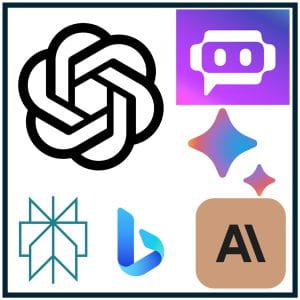Since Chat GPT arrived almost a year ago (30th Nov 2022), the most frequent questions, we, and others in similar roles across the world, were asked at the end of 2022 and into 2023 were, “How can I tell if students have been using AI”, / “How can I stop them” / “Will [insert assessment type] be one that students couldn’t possibly use AI to answer”. Here, at Dundee, we had already been discussing the impact of generative AI (GenAI) becoming more readily available for a year or so before Nov 30th 2022, though it was only a small group of interested staff. Of course, Artificial Intelligence isn’t new, it’s been around since the 1950s (though some would argue the concepts go back to antiquity).
The questions we are now asked, and our discussions, have rapidly evolved to “How should we assess students in the 21st Century”. This change in question reflects the shift we’ve seen over the course of 2023, as Higher Education has moved on from initial reactions of panic and hysteria over GenAI to a recognition that AI is going to change the workplace, society as it becomes more ubiquitous and easy for anyone to use.
While we, alongside everyone else, can’t answer the question directly around how we should assess, we can start the discussion, and prepare for further rapid technological change.

Getting ready
In order to get the most from the posts this week, we’d like you to get ready by creating an account with a GenAI tool. If you do not yet have one, there are a number of choices such as BingChat, Google Bard, ChatGPT, Claude, or Perplexity
If you are a University of Dundee member of staff or student, you should have access to Bing via your University Office 365 Account. For staff, make sure that you have the latest version of the Edge browser (it should be present already on a staff build laptop), If you open Edge, have a look at the icons running down the right – you’ll need the top icon (which may be the bing icon – see the image above), or the newer co-pilot icon which has been rolling out since Nov 1st 2023. Alternatively, in Edge or Chrome, go to Bing.com. Make sure you sign in with your UoD account. For staff from other MS 365 using institutions, you will probably have access to it via your institutional account. Equally, if you are a Google Institution, you’ll probably have access to Bard via your own institutional login. If you have a premium version of Grammarly, you’ll also have access to AI text generation, though we’ll be looking at image generation this week, as well as text generation.
Alternatively you may wish to sign up for another service, such as ChatGPT, Claude or Perplexity, (see the starting list above), however these may require you to share a phone number as well as your email address. If you are unsure or have concerns about how these tools might use your data check this Jisc guide on navigating the terms and conditions of using GenAI tools.
What we’ll cover this week:
- Academic Integrity – can and should we detect AI usage?
- Could GenAI pass your assessment?
- How can GenAI design assessments?
Those of you who have used LearningX before may wonder why this season is shorter than our usual 5, we know that this is such a rapidly changing field so we’re going to be updating this regularly, and future iterations may be longer.

